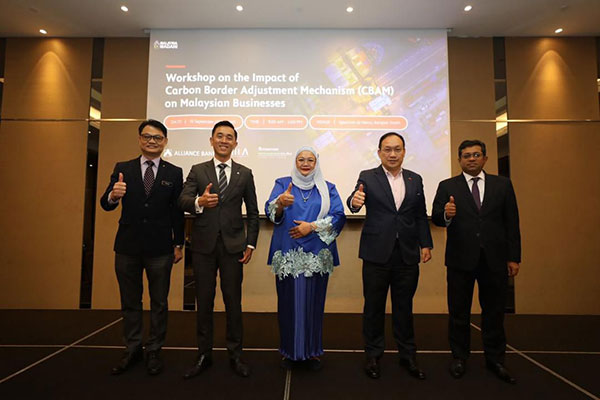18 September 2024
Navigating the EU's Carbon Border Policy: MIDA and Alliance Bank Host CBAM Workshop for Malaysian Businesses
Press Release

(From left) Riverstone Environmental Managing Director & Principal Consultant Hiew Teck Wee, Alliance Bank Group Chief Strategy, Marketing & Business Development Officer Dr. Aaron Sum Wei Wern, Ministry of Investment, Trade and Industry Deputy Secretary General (Investment and Management) Datuk Bahria Mohd Tamil, Ministry of Plantation and Commodities Malaysia Dato’ Dr. Tan Yew Chong and Malaysian Investment Development Authority Chief Executive Officer, Datuk Sikh Shamsul Ibrahim Sikh Abdul Majid at the CBAM Workshop.
CBAM is a carbon border tax designed to address the growing concern of carbon leakage by putting a fair price on the carbon emitted during the production of carbon-intensive goods entering European Union (EU) countries. This innovative mechanism encourages cleaner industrial production in non-EU countries, paving the way for a more sustainable future.
Datuk Bahria Mohd Tamil, the Deputy Secretary General (Investment and Management) of the Ministry of Investment, Trade and Industry (MITI), in her keynote address, stated, “MITI is actively engaging with international partners to promote a low-carbon economy. We’re working together to ensure Malaysia’s interests are represented in global climate negotiations and to facilitate trade for our exporters affected by CBAM.”
She added, “The transition to a low-carbon economy presents both challenges and opportunities for Malaysia. While it’s a new regulatory challenge, CBAM also incentivises sustainable practices and can enhance the long-term competitiveness of our businesses. With strategic planning and government support, we can navigate this transition successfully and drive innovation, improve our environmental credentials, and secure a leading position in the global market.”
While MIDA CEO, Datuk Sikh Shamsul Ibrahim Sikh Abdul Majid highlighted in his remarks, “it’s crucial for everyone involved in the supply chain of European importers to understand the CBAM requirements thoroughly and start taking steps now to meet these new regulations. Being ahead of the curve is vital to maintaining our competitiveness in the global marketplace.”
“I would like to reaffirm MIDA’s commitment to supporting Malaysian businesses in navigating the challenges and seizing opportunities presented by CBAM. The shift towards greener practices is not just a regulatory hurdle, but a chance to innovate, to enhance efficiency, and to position Malaysian businesses at the forefront of sustainable trade,” he further added.
Approximately 75% of Malaysia’s exports to the European Union will be impacted by CBAM, albeit collectively accounting for about 8% of Malaysia’s total exports from 2021 to 2023. The new regulatory requirement will impose significant compliance costs and further drive the importance of sustainability in the global supply chain. Malaysian exporters, particularly those that are heavily reliant on exports to the EU and those that produce carbon intensive products from six groups being cement, iron & steel, aluminum, fertilizers, electricity and hydrogen will be impacted in the initial phase.
“We want to help local manufacturers and exporters build resilience and improve their competitiveness by providing them with the knowledge and guidance to prepare ahead for the implementation of this new regulation from the EU. Alliance Bank has developed a long-term relationship with the SME community, and we know that both financial and non-financial solutions are key to enable the growth of businesses. This partnership will help us reach out to more businesses, particularly local manufacturers and exporters who are most impacted by the CBAM policy, and aide them in preparing their business roadmap for it,” Alliance Bank Group Chief Strategy, Marketing and Business Development Officer, Dr. Aaron Sum.
The workshop was divided into three parts, focusing on CBAM’s impact on businesses, implementation timelines, compliance processes and strategies to navigate them. MIDA also presented the available incentives and grants to assist companies in adapting to the changes. Alliance Bank concluded the session by sharing its various green financing options, including the Sustainability Impact Programme, which offers pragmatic ESG advice and solutions to businesses transition towards more sustainable practices.
